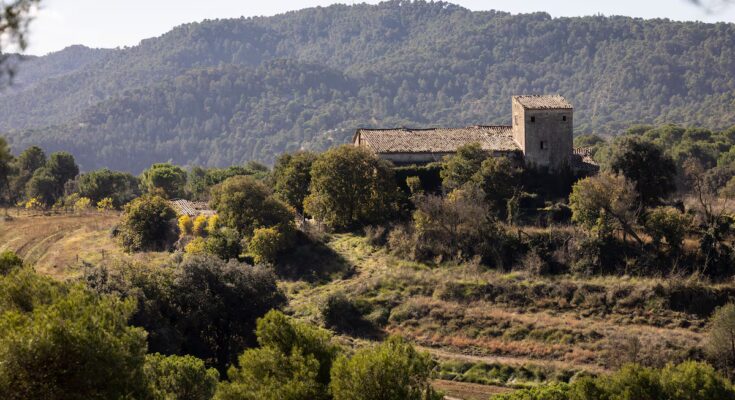Monistrol de Calders, a small town of less than 800 inhabitants in the hinterland of Barcelona, nestled between the mountains and from which around thirty water springs flow, will savor a peace even more sonorous than the one you already know: the peace of the cemetery. The Municipal Administration has enthusiastically welcomed the proposal of a group of investors of Chinese origin residing in Catalonia to build, in the surroundings of an ancient farm now occupied, a cemetery which will follow the principles of feng shui and in which the mortal remains of, among others, members of the Chinese community will rest. If it is built, it will be the first cemetery with these characteristics in Spain; In Europe there has already been one since 2014 in Zwolle (Holland).
Mayor Arturo Argelaguer is enthusiastic about the idea: the dead somehow bring joy and prosperity to the living. “We will have the economic activity of an industrial area without the problems that this entails,” he explains. Shortly after becoming mayor in 2023 with an independent list, Argelaguer was visited by a dozen businessmen. “They had been looking for a suitable place for two years and they asked us if we could welcome them by purchasing the farmhouse to make it a cemetery.” The mayor said yes, even though he set three conditions: an annual allocation of between 20,000 and 40,000 euros to local authorities, the construction of a new football pitch (or a new swimming pool) and that the staff in charge of the work be from the Moianès region. The businessmen accepted all three, and in writing.
Him feng shui It is an ancient method of designing spaces and environments originating in China. The cemeteries adopted its principles: sunlight, presence of water and wind elements and location in natural environments (possibly surrounded by mountains, a symbol of protection for loved ones). “In Monistrol we found a peaceful natural environment. There are no factories or high voltage towers and positive energy can circulate,” explains Carlos, a businessman and vice-president of the Qingtian Association in Catalonia, whose members promoted the project through a company and reached an agreement with a funeral service company. The farm they purchased, of almost 60 hectares, is located on a mountain, is oriented from north to south, surrounded by two rivers, dotted with pine trees and far from the urban center.
Carlos, now 45, arrived as a teenager from Qingtian, a county of more than half a million people that is the birthplace of much of the Chinese community in southern Europe. Of the 350,000 people of Chinese origin living in Spain, a third came from Qingtian; Of these, half (more than 60,000) live in Catalonia. “It is a region of migrants and we also have a museum on immigration,” says Carlos, who has Spanish nationality and is the father of three daughters who study at university and are “totally integrated”.
The idea of their own cemetery was also “naturally” born in the community, which would allow them to follow traditions on land that is already theirs. “My father is getting old and I don’t want to bury him in China. We have established our life here, we will not return. We need a place close to visit our loved ones and rest in peace when the time comes.” Until now, citizens of Chinese origin either repatriate the mortal remains of their deceased to China, that is, away from the family, or are forced to bury them in cemeteries with a Western profile, foreign to their customs, which require, among other things, to be buried at a certain depth and not in niches.
brother peoples
The association invited Argelaguer to visit the city of Dongyuan, in the same county, where Carlos and other compatriots come from. The mayor was surprised by the similarity of the orography of the two municipalities, which have become twinned. Both have a rich history of stonemasons: in Monistrol there are two active quarries, from where entrepreneurs “could obtain the stone” for the project, which involves the restoration of the La Païssa farm and the conditioning of its natural environment. The maximum expected capacity of the cemetery is 80,000 graves including niches, tombs, pantheons and columbaria. It will not be exclusive to the Chinese community: it is also a business and will be “multi-confessional” and will have “doors open to all”.
The property is already owned by the entrepreneurs, but it is in very poor condition and remains occupied by people who, from time to time, disturb the earthly peace of the town. The occupants organize themselves rave Whose echoes ring throughout Monistrol; the last one, at the end of last year, when the police had to search and rescue one of the participants by helicopter: they found him under the influence of drugs. For the mayor, the cemetery not only represents an injection of money, but also solves a long-standing problem. The project presented to the City Council will now have to be approved by the Urban Planning Department of the Generalitat and, subsequently, by the municipal plenary session.
For Xiaobing Wang, president of the Chinese Cultural Center of Manresa (half an hour’s drive away, it is one of Monistrol’s reference cities), the cemetery is “an example of the roots” of the Chinese in Spain. “The third, fourth or fifth generation is already here and is unlikely to visit deceased relatives in China,” he explains. “Over time,” adds the mayor of Monistrol, “all cultures end up implanting themselves and taking root.”



